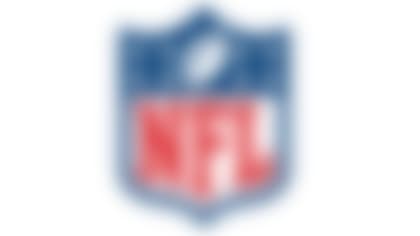There is an easy answer to the question, of course.
How do you beat the New England Patriots?
Well, over the last two months, since an ugly afternoon in Cleveland, you don't.
They've reeled off eight consecutive wins, and only two of those (a dogfight with the Matt Flynn-led Packers and a near collapse against Peyton Manning and the Colts) were really in question down the stretch. The margins of victory in the other six: 13, 21, 42, 29, 31, 31. And three of those came over playoff teams.
The franchise's revival has reflected a return to its championship roots, with no-name players and aging veterans supplanting big-ticket items like Randy Moss and Adalius Thomas as the team's roster builders have halted an effort to turn players into their types, and gone back to finding their type of guys.
As such, you hear the same sort of things about this team that you did about those in 2001, '03 and '04.
"You've got the quarterback, and in the playoffs having the quarterback is everything," said one AFC personnel director. "He's been there, won at a high level, and this year he's played so well running that offense. And then, it's some of their young personnel making plays when they need it.
"They don't have a dynamic runner, but the running game is impressive because they have enough depth. And they have veteran depth that helps with the rookies they've added, whether it's the tight ends or different guys across the board, that's so important. They dump Randy Moss; other people step up. (Wes) Welker has been Welker, they brought (Deion Branch) back, he's played well. That's the New England staple -- guys have stepped up when called upon, and you have to attribute it to coaching. I don't think their personnel is great. But their coaching staff is phenomenal."
The old formula has New England 12 quarters away from winning a fourth Super Bowl title, and pulling Bill Belichick even with Chuck Noll, and Tom Brady into the rare air of Joe Montana and Terry Bradshaw.
Make no mistake, this is very much, as the AFC personnel director said, about Belichick, because this team, much more so than the 2007 club that went 18-0 before being shocked in the Super Bowl, is carved in his image. "It's situational football," said another AFC personnel chief. "and it's complementary football."
So one more time ... just how do you beat these Patriots?
In one way, you have to avoid playing their game, and keep the magnificent Brady from turning the game into a track meet. In another, you have to play their game -- mistake-free, opportunistic ball.
"You have to hit them in the mouth, and establish your will," said Jets linebacker Calvin Pace, who will get his chance on Sunday when New York travels to Foxborough to face the Patriots for the third time this season. "One thing I appreciate as a player with the Patriots is they don't beat themselves. No foolish penalties. They run their system, they execute, and they can get away from you quick. Obviously they're rolling, and they've gotten in a comfort zone. So you have to be on point."
More specifically? After getting some informed opinions, here are five things that are important, if not necessary, to going into Gillette Stadium and slaying the NFL's giant:
1. Weather the storm
The Patriots have holes to exploit defensively, so you better take advantage early. Jets offensive players, following their win against the Colts on Saturday, explained that early in their December loss to New England, the Patriots played a lot of man coverage, and New York failed to take advantage. Then, the home team's offense built a lead, and that allowed Belichick and Co. to slip into safer Cover-2 zones.
The bottom line is that the New England defense plays a smart game, and held four of its last five opponents to seven or fewer points, but did rank 25th overall in the league for a reason. If you can prevent an early outburst, like the Packers did and like the Jets didn't, it'll be harder for the Patriots' defensive coaches to call the game in a way that masks the holes.
"The defense isn't a strong point, but the defense is predicated on situations," said the second personnel director. "All of a sudden, it's 17-3 or 21-7, your game plan might change, and so does theirs. They're getting you in predictable situations, and that directly impacts the defense. They're not getting the pressure production they used to, the linebackers are workmanlike, the DBs have really improved. It all comes back to two things -- this is a well-coached team and they don't beat themselves."
2. Score touchdowns
Obvious, right? Of course. But there's some depth to this one. The Patriots' offense ranks fourth in the NFL in red-zone offense, having scored 42 touchdowns on its 67 possessions that gained passage inside the opponents' 20.
Brady's bunch generally doesn't get into field-goal battles, so the opponent can't either. The Patriots are middling (19th) in red-zone defense. So in order to keep the game close early, an offense has to capitalize on its chances, and score touchdowns, not field goals.
"They're going to score points," said the first personnel director. "You have to match them, knowing you can't get in a field-goal game with them." Interesting fact: The three teams left with New England in the AFC bracket (Jets, Ravens, Steelers) rank in the bottom 11 in the NFL in red-zone offense.
3. Possess the ball
The Jets' 17-play, 87-yard drive that resulted in a fourth-quarter touchdown against the Colts Saturday night is a good example of the kind of drive that could be a Patriot killer. And there's more than one reason why. It shortens the game and potentially costs Brady possessions, gives your defense a break, and wears on the New England defense.
The Jets and Steelers were among just six teams to average more than 32 minutes of possession per game during the regular season. The Ravens fell just short of that mark, although they possessed the ball for almost 42 minutes in their 30-7 wild-card win at Kansas City on Sunday. Winning on third down is the key -- the Patriots' defense ranks dead last in that category league-wide -- as an offense works to extend drives against a unit that has its flaws, but rarely gives up the home run.
"It sounds simple, but you have to have the ball," said the first personnel director. "A good running team can keep that defense on the field, wear them out, and keep Brady on the sideline. ... You can get them to where in the fourth quarter, you can score at will, but it takes forcing them to stay on the field defensively."
4. Make Brady earn it
Another way to limit possessions is keeping Brady and Co. from scoring 40- and 50-yard touchdowns. Without Moss, the Patriots have made big plays in different ways -- more of them coming on catch-and-run and screen situations than with shots downfield, and through a system that's built to force the defense to account for all areas.
"There's no effort to get one guy the football," said the second personnel director. "They have a complete passing-game balance, with dangerous players at receiver, tight end, they use their backs as receivers, you have the screen game with (Danny) Woodhead. They divvy up touches, and there's not a pure deep threat. But they force you to defend them laterally, less vertically. They spread you out and stretch the field laterally, force man-to-man situations and allow Brady to methodically pick the defense apart."
So if they're going to make big plays, it's going to be through a numbers game, which limits the amount of defenders that can get to a receiver after he catches the ball. That means a defense has to make one-on-one open-field tackles, which is easier said than done against spread-specific weapons like Welker, Woodhead and tight end Aaron Hernandez. The idea that the offense is more dangerous without Moss? "I don't think that's crazy at all," said the personnel director.
5. Avoid mistakes
Maybe your defense will get a turnover against New England. But it's hard to count on that in order to win. The Patriots have yielded just 10 giveaways this year, and their whopping plus-28 turnover ratio is 11 clear of the NFL's second most proficient team in that category (Pittsburgh), and doubles the figure of the third-ranked club (Atlanta).
So assuming there's not some sort of five-turnover aberration in the offing, the Patriots' opponent has to control what it can in this regard, and that means taking care of the ball has to be the highest priority. What's difficult about that is Belichick is a master at taking away the other team's strength, so the opponent has to operate proficiently, oftentimes outside of its comfort zone.
"They do a really good job of finding your weakness, and they exploit it," Jets guard Brandon Moore said. "Every coach tries, but this is (Belichick's) trademark. Your tendencies, the things you don't do well, he's going to take advantage. They make sure you're not doing what you do well, shut that down, and force you to adjust. And then, before you know it, Tom Brady has them up three touchdowns."
In the end, the biggest problem here is that this collection of players is suited to accentuate the greatest strengths of the two key cogs in the Patriots' wheel -- Brady and Belichick. And that's because of balance that allows the quarterback to play his game, sort of like Magic Johnson of NFL field generals, which in turn gives the coach leeway to play his situational, complementary game at the highest level.
"To me," Pace said, "they're better without Moss. They have more guys doing different things."
"When you walk into that stadium with Brady, the team is going to have confidence, and they feed off of that," Moore added. "They don't get too exotic on defense; it's not like Baltimore, with all the crazy looks. The biggest thing is they get up and they get you pressing, then the penalties and turnovers come, and they have the offense and defense to capitalize. It's not a mistake, either. They force those things."
In short, what Moore is saying is that the Patriots force their game on you, and you out of your own game, which is a tremendous credit to Belichick, who might not have the best players, but has found the right ones.
"I think it's outstanding," said the second personnel director. "He knew where the strengths and weaknesses were on that roster. He's accentuated the strengths, improved the weaknesses. He integrated young talent -- you've seen that with significant roles to rookies at tight end and in the secondary -- and you see improvement. It's just been an outstanding effort by Bill."
And, as a result, it will take a similarly outstanding effort to take his team down.



